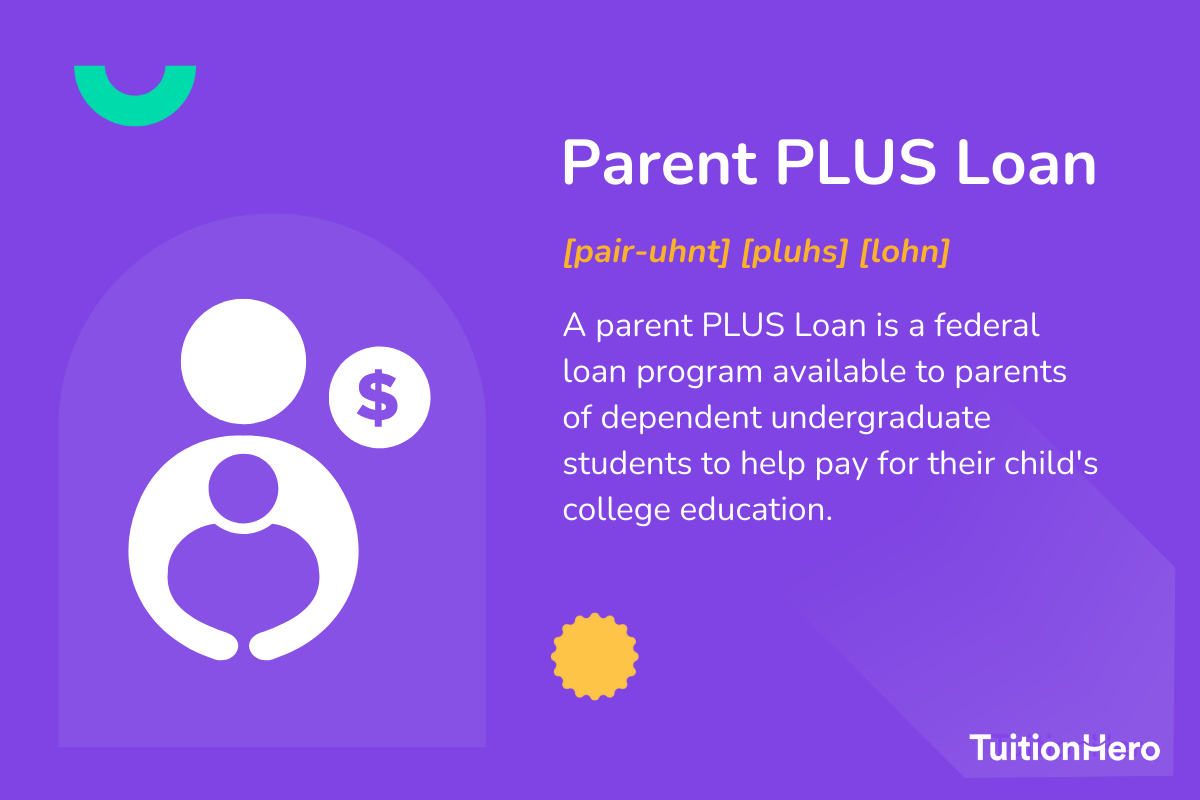Advertiser Disclosure
Last update: November 17, 2024
5 minutes read
What are Federal Parent PLUS Loans? (Explained)
Explore the essentials of Parent PLUS loans: rates, qualifications, pros, cons, and alternatives.

By Brian Flaherty, B.A. Economics
Edited by Rachel Lauren, B.A. in Business and Political Economy
Learn more about our editorial standards



By Brian Flaherty, B.A. Economics
Edited by Rachel Lauren, B.A. in Business and Political Economy
Learn more about our editorial standards
Wondering how to pay for the remaining tuition costs that your child's financial aid didn't fully cover? You can consider a federal Parent PLUS loan, which comes with fixed rates and different repayment plans.
Let's find out what a Parent PLUS loan is and how it might help you pay for your child's education, without causing financial issues for you. We'll talk about how to borrow, flexible ways to repay, and even mention some opportunities for loan forgiveness. Also, you’ll learn how to not go overboard when borrowing with Parent PLUS loans.

Key takeaways
- Parent PLUS loans allow you to borrow up to your child’s full educational cost, minus other aid
- They come with fixed interest rates and plenty of repayment options, including opportunities for forgiveness.
- Alternatives like private parent loans might offer lower interest rates but without the benefits of federal loans.
What is a federal Parent PLUS loan?
A federal Parent PLUS loan is a government-offered loan that parents can use to pay for their child's education costs not covered by other financial aid. It offers fixed interest rates and flexible repayment options, along with potential paths to loan forgiveness.

How does a Parent PLUS loan work?
Parent PLUS loans are part of the federal financial aid program that lends money to parents for their child's education expenses. You can borrow up to the total cost of school minus any financial aid like scholarships or grants.
These loans have a fixed interest rate, which means there are no surprises as you repay. They also have a specific list of repayment plans to fit different financial scenarios.
Here's a quick breakdown of the current Parent PLUS loan basics:
- Loan amounts: Total cost of attendance, minus other aid
- Fixed interest rate: 8.05%
- Repayment terms: 10-year standard, with extended options
- Loan origination fee: 4.228%, subtracted upfront from the disbursement amount
Who qualifies for a Parent PLUS loan?
Not everyone can qualify for these loans. To be eligible for a Parent PLUS loan, you need to be the biological or adoptive parent of a dependent undergrad student.
The student must be enrolled at least half-time at a recognized institution. Credit checks are done, but you don’t need perfect credit to be eligible. However, a credit history that includes delinquency or default might create the need for a cosigner, or as we call it in the federal loan world, an endorser.
Step-by-step: Applying for a Parent PLUS loan
Applying for a parent PLUS loan involves a few steps. While applying for the loan itself can take less than a half-hour on the official Student Aid website, you’ll need to take care of a few other items before getting to that point:
- FAFSA first: your child needs to file the Free Application for Federal Student Aid (FAFSA). It's the gateway to all federal loans.
- Search for scholarships: before diving into loans, exhaust every last scholarship and grant opportunity. Free money beats borrowed money any day.
- Calculate the dollar amount: calculate the remaining funds needed after other aid has been accounted for using a student loan calculator.
- Application time: complete the parent PLUS application at StudentAid.gov and keep your child's school financial aid office on speed dial for questions.
- Repayment reality: Choose a repayment plan that aligns with your financial situation. The standard plan is 10 years, but there are other options too.
What are the alternatives to Parent PLUS loans?
Sometimes the PLUS loan isn't the perfect match. Maybe a private loan with a potentially lower interest rate could be a better fit for your wallet.
Remember though, with private loans, you lose some of the benefits that federal student loans give you—things like loan forgiveness and flexible repayment plans. Consider every angle before you commit.
Compare private student loans now
TuitionHero simplifies your student loan decision, with multiple top loans side-by-side.
Compare Rates
Dos and don'ts of Parent PLUS loans
When it comes to Parent PLUS loans, navigating the ins and outs is important. Making smart choices can keep your finances in check while supporting your child’s education. Here's a quick reference table to help you remember the key actions to take and things to avoid.
Do
Do file the FAFSA to kickstart the process.
Do exhaust scholarship and grants before borrowing.
Do use a student loan calculator to estimate payments.
Do consider your repayment options carefully.
Do explore loan forgiveness opportunities.
Don't
Don't overlook credit mistakes; address them first.
Don't borrow more than needed, even if you can.
Don't forget about the loan fee, which will cut the final amount received.
Don't delay payments without considering deferment or forbearance.
Don't assume private loans have the same benefits as federal ones.
Advantages and disadvantages of Parent PLUS loans
Parent PLUS loans can help families pay for college, but they have both positives and negatives. It's important to understand these aspects to decide if taking this federal loan makes sense for your financial plan.
- Fixed interest rate for stable planning
- Options to borrow up to the full cost of attendance, reducing upfront expenses
- Availability of multiple repayment plans for flexible budgeting
- Potential for loan forgiveness, offering relief at the end of your repayment term
- Has an origination fee, which slightly reduces the actual amount received
- Payments start right away, which could hurt your budget
- Limited eligibility for income-driven repayment plans - only available after consolidation
- Risk of overborrowing if you miscalculate the total aid your child will receive

Why trust TuitionHero
At TuitionHero, we offer comprehensive financial guidance, including Private Student Loans, Student Loan Refinancing, Scholarships, FAFSA assistance, and Credit Card options. We support every aspect of Parent PLUS Loans, from borrowing calculations to repayment plans, ensuring you can assist with your child's education while maintaining your financial stability.
Frequently asked questions (FAQ)
Yes, Parent PLUS Loans are specifically designed for parents of dependent undergraduate students. They are the only federal borrowing option available to parents.
No, your child can't take over a Federal Parent PLUS Loan directly. The parent who borrowed the money is the one who has to pay it back.
But, after your child graduates, you might look into options where they take over the loan. This could mean refinancing with a private lender; but keep in mind that this might mean losing some benefits that come with federal loans.
Yes, parents can consolidate multiple Parent PLUS Loans into a Direct Consolidation Loan. This can simplify loan repayment by combining multiple loans into a single monthly payment.
Final thoughts
Helping your child with the financial side of college is a big deal. A Parent PLUS loan can be a helpful tool if you plan carefully and avoid getting into too much debt.
With TuitionHero, we're here to help you figure things out together. Our goal is to guide you and give you the information you need—whether it's choosing the right loan or finding the best way to pay it back. Keep going with confidence, knowing you have the support to make smart choices for your family's education and financial future.
Source
Author

Brian Flaherty
Brian is a graduate of the University of Virginia where he earned a B.A. in Economics. After graduation, Brian spent four years working at a wealth management firm advising high-net-worth investors and institutions. During his time there, he passed the rigorous Series 65 exam and rose to a high-level strategy position.
Editor

Rachel Lauren
Rachel Lauren is the co-founder and COO of Debbie, a tech startup that offers an app to help people pay off their credit card debt for good through rewards and behavioral psychology. She was previously a venture capital investor at BDMI, as well as an equity research analyst at Credit Suisse.
At TuitionHero, we're not just passionate about our work - we take immense pride in it. Our dedicated team of writers diligently follows strict editorial standards, ensuring that every piece of content we publish is accurate, current, and highly valuable. We don't just strive for quality; we aim for excellence.
Related posts
While you're at it, here are some other college finance-related blog posts you might be interested in.
Shop and compare student financing options - 100% free!

Always free, always fast
TuitionHero is 100% free to use. Here, you can instantly view and compare multiple top lenders side-by-side.

Won’t affect credit score
Don’t worry – checking your rates with TuitionHero never impacts your credit score!

Safe and secure
We take your information's security seriously. We apply industry best practices to ensure your data is safe.
Finished scrolling? Start saving & find your private student loan rate today





